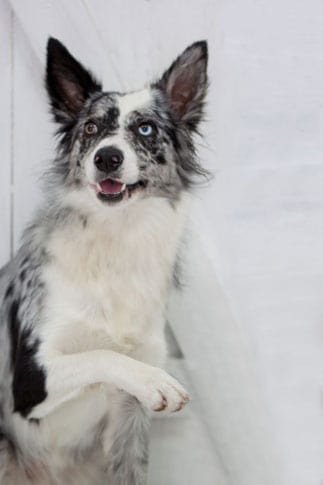Last Updated on 12/08/2020 by Veronica Jones
Border Collies come in a wide range of colors, from lilac to gold, with patterns from black and tan to sable.
However, something about the depth of colors in blue merle, especially when paired with blue eyes in the exceptionally intense stare of a Border Collie, really catches the eye.
The colored parts of the coat are blueish grey with patches and specks of black and white.
These dogs often have a little bit of warm brown or tan on the face and legs, which helps to offset the cool blues and blacks. White markings are typically up the chest and on the face.
What is merle?
Merle is a pattern and a dilution gene that expresses itself in a number of different breeds, including Border Collies.
The gene causes areas where colors are diluted, creating a marbled pattern.
- Black dogs will have patches of grey.
- A dog who is blue will have patches of gray, dark, blue, and dark grey.
- Merle dogs often have blue eyes.
A Border Collie must have a merle parent in order to be merle themselves.
A dog who has a merle gene will be merle, regardless of the color of its other parent. In this way, the gene for merle is dominant.
However, the gene has a unique way of reacting when combined with another gene for merle.
This unique way of behaving means that the merle gene is incompletely dominant, and that it has negative consequences for puppies with two merle genes.
Dangers of merle to merle breeding
Breeding two merle Border Collies has some serious consequences for the puppies.
These dogs, known as “double merle” have distinct characteristics, some of which are very negative.
- Puppies are mostly white with a few merle spots
- Most are completely deaf, although some have slight hearing
- Many have poor vision or are blind
- Some may be both blind and deaf
In a litter of puppies born to two blue merle parents, a quarter will be solid, half will be normal blue merle, and a quarter will inherit the double merle gene and possible health consequences.
Double merle Border Collies, regardless of their health, will always produce merle puppies.
Merle puppies with only one gene for merle will not inherit deafness or blindness.
Therefore, double merle Border Collies are sometimes bred on purpose by irresponsible breeders who want to sell more merle puppies.
Adopting a double merle Border Collie
Despite the known dangers, double merle Border Collies are born throughout the US.
Dogs who have a disability in eyesight or hearing as a result of their genes are often surrendered to animal shelters or rescues by owners who have no use for them or can’t handle them.
Sometimes these puppies are sold by irresponsible breeders who don’t declare the puppy’s disability.
Regardless of the rumors that exist that double merle dogs are less trainable, more aggressive, sickly, etc. none of this is true.
These dogs are deaf and/or blind, and that is the only way in which they are unlike the typical Border Collie.
Adopting a deaf and/or blind Border Collie is a huge decision because these dogs are:
- Smart. Intelligence can be a double edged sword in an active dog like the Border Collie. You will have to find ways to communicate with your dog, whether they are deaf or blind. Owners have great luck with remote collars and other signals. If you are committed to a unique training style, you may have fun training a double merle Border Collie, but get ready to settle in for a lot of training, because Border Collies require extensive engagement.
- Active. Just because your dog is blind and/or deaf doesn’t mean they aren’t going to have a lot of energy. Depending on your dog’s disability, providing them with enough exercise to wear out their endless energy can be very challenging. That said, these highly trainable dogs can learn to jog, bicycle, etc. with you despite their limitations, and they often love to play with other dogs who are sensitive to their needs.
- May be poorly bred. A double merle dog is never a good choice, so while the gene isn’t necessarily tied to any other health problems, these dogs may be more likely to suffer other health problems resulting from poor breeding.
 If you carefully consider the limitations and risks of adopting a double merle Border Collie, you can adopt a loving, devoted, intelligent dog who is highly trainable.
If you carefully consider the limitations and risks of adopting a double merle Border Collie, you can adopt a loving, devoted, intelligent dog who is highly trainable.
These dogs can compete at very high levels of agility and other canine athletics.
Deaf dogs may be even better at focusing on you during competition than hearing dogs. Blind dogs may show a great attentiveness to voice commands and excel in obedience.
Living with a dog who is sight or hearing impaired may be a great opportunity for you to get to know a very special dog.
What blue merle isn’t

It is very easy to mistake a merle pattern for another pattern, especially in a breed with as many diverse color and pattern variations as the Border Collie.
Here are some ways to tell the difference.
- Merle is a dilution. Merle occurs on colored areas of the Border Collie’s body, causing the pigment to appear lighter there. If the patches that you see are multiple colors, not lighter variations, it is probably not merle.
- Merle doesn’t occur on white. Many dogs may have ticking or freckling, that is, specks or dots of color, on the white areas of their coats. This is not merle, since merle occurs on colored, not white, areas of the coat.
- Not all dogs with blue eyes are merle. Merle dogs and Border Collies who have a lot of white on their faces both tend to have blue eyes, but not every dog with blue eyes is merle.
Are blue merle Border Collies healthy?
There is no reason to think that a Border Collie with only one copy of the gene for merle should be any less healthy than any other Border Collie.
These dogs are no more prone to deafness or blindness than dogs with two copies of the merle gene.
Like all Border Collies, blue merle Border Collies may be prone to hip problems like hip dysplasia and eye problems, so it’s a good idea to only purchase from a breeder who clears dogs for hips and eye.
Should you get a blue merle Border Collie?

If you are up for the challenge of owning a Border Collie, a blue merle Border Collie is as good a choice as any other color that you are considering.
There are a few considerations in choosing a merle Border Collie over other varieties.
- If you intend to breed your dog, you will need to be extremely careful about choosing a partner that isn’t merle.
- If you don’t plan to fix your dog, you will have to be extremely careful about unintended breeding with not only merle Border Collies, but any merle breed. This includes breeds like the Australian Shepherd, Cardigan Welsh Corgi, and Dachshunds.
- Blue merle Border Collies might cost more than other color varieties since they can’t be depended on in a litter and since keeping merle dogs in a breeding facility may have risks.
See other other breeds of dogs:

